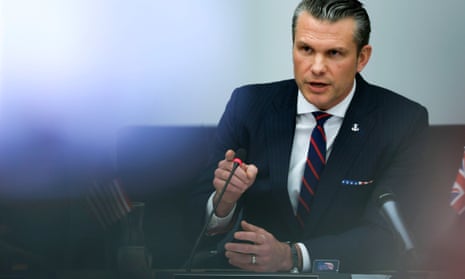US defence secretary comments on Ukraine – summary
US defence secretary Pete Hegseth has just addressed the Ukraine Defence Contact Group at a meeting in Brussels, and here is a summary:
-
“Bloodshed must stop, this war must end,” he insisted (14:42).
-
He warned that returning to pre-2014 Ukraine borders was “unrealistic,” and “chasing this illusionary goal will only prolong the war and cause more suffering” (14:43).
-
He said that “the US does not believe that Nato membership for Ukraine is a realistic outcome of a negotiated settlement” with Russia.
-
He ruled out any US deployment to Ukraine or covering peacekeeping forces there with Article 5 Nato guarantees, saying it would be up to European and non-European troops to organise the forces (14:47).
-
He urged Europeans to “provide the overwhelming share” of aid to Ukraine and level with their citizens “about the threat facing Europe” (14:48).
-
In a stark warning, he said that “stark strategic realities prevent the US from being primarily focused on the security of Europe” as it looks at “threats to our homeland,” including from China (14:50).
-
He acknowledged some action taken by European allies, name-checking Sweden and Poland, but said “more must still be done” (14:51).
-
He insisted that the US remains committed to Nato, but “will no longer tolerate an imbalanced relationship which encourages dependency” (14:52).

Key events
-
Hegseth’s comments on Ukraine, Nato, and European security – video
-
US no longer ‘primarily focused’ on Europe’s security, says Pete Hegseth – first report
-
Far right-led Austrian coalition talks collapse
-
US defence secretary comments on Ukraine – summary
-
‘We are and we will’ step up, UK defence secretary responds
-
US committed to Nato, but won’t tolerate ‘imbalanced relationship,’ US defence secretary says
-
Europe stepping up to the task, but we need more, Hegseth says
-
US cannot be primarily focused on security in Europe, US defence secretary says
-
Europe must provide ‘overwhelming share’ of aid to Ukraine, US defence secretary says
-
US will help with energy production to defund ‘Russian war machine,’ US defence secretary says
-
Nato membership for Ukraine ‘not a realistic outcome,’ US defence secretary says
-
Returning to pre-2014 Ukraine borders ‘unrealistic’ and ‘illusory’ goal, US defence secretary says
-
‘Bloodshed must stop, this war must end,’ US defence secretary says
-
US defence secretary Pete Hegseth speaks on Ukraine
-
Critical meeting on Ukraine defence gets underway
-
Senate leader takes Romanian presidency until May elections
-
Greece gets new president
-
Europe has no leader to talk to Trump, AfD’s Weidel says, rolling out her election pitch alongside Hungary’s Viktor Orbán
-
EU withdraws proposed rules on AI liability
-
Germany extends border controls for six months
-
Russia’s 2024 defence budget exceeded all of Europe’s combined, study says
-
Hungary’s Orbán to meet AfD’s Weidel in Budapest
-
Western Africa to Canary Islands remains most active route for irregular migration in Europe, EU’s external border agency says
-
US defence secretary Hegseth meeting with UK’s Healey
-
Trump’s US merely a ‘necessary partner,’ less a true ally, Europeans say
-
Morning opening: All eyes on Ukraine
Hegseth’s comments on Ukraine, Nato, and European security – video
US no longer ‘primarily focused’ on Europe’s security, says Pete Hegseth – first report

Dan Sabbagh
Defence and security editor
Donald Trump’s newly appointed defence secretary told allies on his first international trip that the US was no longer “primarily focused” on European security and that Europe would have to take the lead in defending Ukraine.
Pete Hegseth, speaking to defence ministers at a lunchtime meeting in Brussels, said Europe had to provide “the overwhelming share” of future military aid to Kyiv – and recognise that restoring Ukraine’s pre-2014 borders was unrealistic.
The Pentagon chief said he was “here today to directly and unambiguously express that stark strategic realities prevent the United States of America from being primarily focused on the security of Europe” – though the language was notably toned down from a draft briefed in advance to the press.
Our first story:
Far right-led Austrian coalition talks collapse
We will return to Hegseth’s comments soon, but let’s briefly take a look at events elsewhere as talks to form Austria’s first coalition government led by the far-right Freedom Party (FPÖ) collapsed on Wednesday after negotiations with the conservative People’s Party (OVP) had already ground to a halt, with each side blaming the other, Reuters reported.
The Eurosceptic, Russia-friendly FPÖ had been seeking to lead a government for the first time since it was founded in the 1950s under a leader who had been a prominent Nazi.
The FPÖ came first in September’s parliamentary election with about 29% of vote, but was only tasked with forming a government last month once a centrist attempt to do so without it failed. The OVP was its only potential coalition partner.
“Just now, FPÖ leader … Herbert Kickl informed President Alexander Van der Bellen that the coalition talks with the OVP have failed,” the FPÖ said in a statement moments after Kickl met Van der Bellen in the president’s office.
Reuters notes that the ball is now in Van der Bellen’s court. Most likely either a centrist attempt to form a government will be revived or the Alpine republic will head towards a snap election with polls suggesting the FPÖ’s lead over other parties would grow.
US defence secretary comments on Ukraine – summary
US defence secretary Pete Hegseth has just addressed the Ukraine Defence Contact Group at a meeting in Brussels, and here is a summary:
-
“Bloodshed must stop, this war must end,” he insisted (14:42).
-
He warned that returning to pre-2014 Ukraine borders was “unrealistic,” and “chasing this illusionary goal will only prolong the war and cause more suffering” (14:43).
-
He said that “the US does not believe that Nato membership for Ukraine is a realistic outcome of a negotiated settlement” with Russia.
-
He ruled out any US deployment to Ukraine or covering peacekeeping forces there with Article 5 Nato guarantees, saying it would be up to European and non-European troops to organise the forces (14:47).
-
He urged Europeans to “provide the overwhelming share” of aid to Ukraine and level with their citizens “about the threat facing Europe” (14:48).
-
In a stark warning, he said that “stark strategic realities prevent the US from being primarily focused on the security of Europe” as it looks at “threats to our homeland,” including from China (14:50).
-
He acknowledged some action taken by European allies, name-checking Sweden and Poland, but said “more must still be done” (14:51).
-
He insisted that the US remains committed to Nato, but “will no longer tolerate an imbalanced relationship which encourages dependency” (14:52).
‘We are and we will’ step up, UK defence secretary responds
UK defence secretary John Healey responds on behalf of European Nato countries and the broader Ukraine Defence Contact Group:
We hear you, your commitment to Nato, to Article 5, to a sovereign Ukraine, and to your defence partnership with Europe.
We also hear your concerns.
On stepping up for Ukraine, we are and we will.
On stepping up for European security, we are and we will.
You’ve just spoken about peace through strength. We are 50 nations-strong here, all determined to put an end to Putin’s war, and to do so together.
US committed to Nato, but won’t tolerate ‘imbalanced relationship,’ US defence secretary says
Closing his speech, Hegseth insists that the US remains committed to Nato and to partnership with Europe, “full stop.”
But the United States will no longer tolerate an imbalanced relationship which encourages dependency.
Rather, our relationship will prioritise empowering Europe to own responsibility for its own security.
Honesty will be our policy going forward, but only in the spirit of solidarity.
He ends his speech here.
Europe stepping up to the task, but we need more, Hegseth says
US defence secretary then goes on to say that in his first week he has seen “promising signs that Europe sees the threat, understands what needs to be done, and is stepping up to the task,” pointedly praising Sweden and Poland.
“But these are just the first steps. More must still be done,” he says, asking Europeans to “step up fulfilling the commitments you have made.”
Our transatlantic alliance has endured for decades, and we fully expect it will be sustained for the generations to come. But this won’t just happen.
It will require our European allies to step into the arena and take ownership of conventional security on the continent.
US cannot be primarily focused on security in Europe, US defence secretary says
In a stark warning to European leaders, Hegseth says that he wants to “directly and unambiguously express that stark strategic realities prevent the United States from being primarily focused on security in Europe.”
“The United States faces consequential threats to our homeland. We must – and we are – focusing on securing our own borders,” he says.
He says the US faces “a peer competitor in the Communist Chinese with the capability and intend to threaten our homeland and core national interests in the Indo-Pacific.”
“The US is prioritising deterring war with China in the Pacific, recognising the reality of scarcity, and making the resourcing tradeoffs to ensure deterrence does not fail.
He adds:
As the United States prioritises its attention to these threats, European allies must lead from the front.
Europe must provide ‘overwhelming share’ of aid to Ukraine, US defence secretary says
Continuing his speech in Brussels, US defence secretary Pete Hegseth says that “safeguarding European security must be an imperative for European members of NATO,” and Europe “must provide the overwhelming share of future lethal and nonlethal aid to Ukraine.”
“This means donating more ammunition and equipment, leveraging comparative advantages, expanding your defence industrial base, and importantly, levelling with your citizens about the threat facing Europe,” he says.
US will help with energy production to defund ‘Russian war machine,’ US defence secretary says
Hegseth continues:
To further enable effective diplomacy and drive down energy prices which fund the Russian war machine, President Trump is unleashing American energy production and encouraging other nations to do the same. Lower energy prices coupled with more effective enforcement of energy sanctions will help bring Russia to the table.
Nato membership for Ukraine ‘not a realistic outcome,’ US defence secretary says
Presenting the US position on Ukraine, the defence secretary says that any “durable peace for Ukraine must include robust security guarantees to ensure that the war won’t begin again”.
“The US does not believe that Nato membership for Ukraine is a realistic outcome of a negotiated settlement,” he adds.
He says that any security guarantees should not be provided through Nato membership, “but instead must be backed by capable European and non-European troops,” who would not be covered by Article 5 Nato guarantees.
He also rules out the deployment of US troops to Ukraine.
Returning to pre-2014 Ukraine borders ‘unrealistic’ and ‘illusory’ goal, US defence secretary says
Continuing his speech, US defence secretary Peter Hegseth calls for “realistic assessment of the battlefield.”
We want a sovereign and prosperous Ukraine. But we must start by recognising that returning to Ukraine’s pre-2014 borders is an unrealistic objective.
Chasing this illusionary goal will only prolong the war and cause more suffering.
‘Bloodshed must stop, this war must end,’ US defence secretary says
Speaking ahead of the Ukraine Defence Contact Group’s meeting in Brussels, US secretary defence Pete Hegseth says the conference is “at a critical moment,” and insists the US view is clear:
The bloodshed must stop, and this war must end.
He says that for US president Donald Trump “stopping the fighting and reaching and enduring peace is a top priority,” and he intends to “bring both Russia and Ukraine to the table.”
US defence secretary Pete Hegseth speaks on Ukraine
Let’s hear what he’s got to say about Donald Trump’s new US administration’s plans for Ukraine.
Critical meeting on Ukraine defence gets underway
The Ukraine Defence Contact Group, including US defence secretary Pete Hegseth on his first trip to Europe, is meeting in Brussels today.
And they are starting their first session right now.
We have a live stream for you at the top and below, and will cover the key lines in the blog.
Senate leader takes Romanian presidency until May elections
And it’s not just Greece: Romania’s liberal party leader Ilie Bolojan, part of the ruling coalition, took office as interim president today after the pro-European incumbent Klaus Iohannis, threatened with impeachment, resigned earlier in the week, AFP reports.
Bolojan, the Senate president and liberal party (PNL) leader, will stay in office until a new presidential election is held in May.
Greece gets new president

Helena Smith
in Athens
The former House speaker and ruling New Democracy party MP Kostantinos Tasoulas was elected Greek president today when 160 deputies cast ballots in his favour in the fourth and final round of the vote.
A total of 276 MPs had participated in the vote. He replaces the country’s first female president, Katerina Sakellaropoulou, when he is officially sworn in on 13 March.
Nominated for the post by prime minister Kyriakos Mitsotakis, the veteran politician had been assured victory if he secured a simple majority of 151 votes in the 300-member parliament. The centre right New Democracy party controls 156 seats.
Opponents included the prominent academic and former politician Tasos Giannitsis, backed by the main opposition Pasok party, Louka Katseli, a former national economy minister supported by the left-wing SYRIZA and New Left parties, and Kostas Kyriakou fielded by the far-right Niki party. Giannitsis picked up 34 votes, Katseli 29 and Kyriakou 14. A total of 24 MPs were absent and 39 declined to vote for any candidate.
Speaking after his election Tasoulas, who is also a former culture minister, highlighted the need for national unity.
“Regardless of individual disagreements, the invisible thread that units us must not be broken,” he said.
In a separate statement, prime minister Mitsotakis emphasised the president-elect was the right man for the right job. “He will rise to the high role of symbol of our national unity, as well as being a guarantor of democratic stability and constitutional continuity.”
From the outset Tasoulas’ nomination has been fraught with controversy with opposition parties deploring his nomination for being overtly political for a post that should be above party politics.
Confronted by an ascendant right, critics had seen Mitsotakis’ choice as a flagrant sop to traditionalists in New Democracy. Liberals had wanted to see Sakellaropoulou, a former high court justice, stay on.
Although widely praised for her decorum and moral compass, the outgoing president is thought to have caused consternation among conservatives and in the Greek Orthodox Church with her overt support for minority rights and gay marriage legislation championed by Mitsotakis, a self-described moderate, last year.







